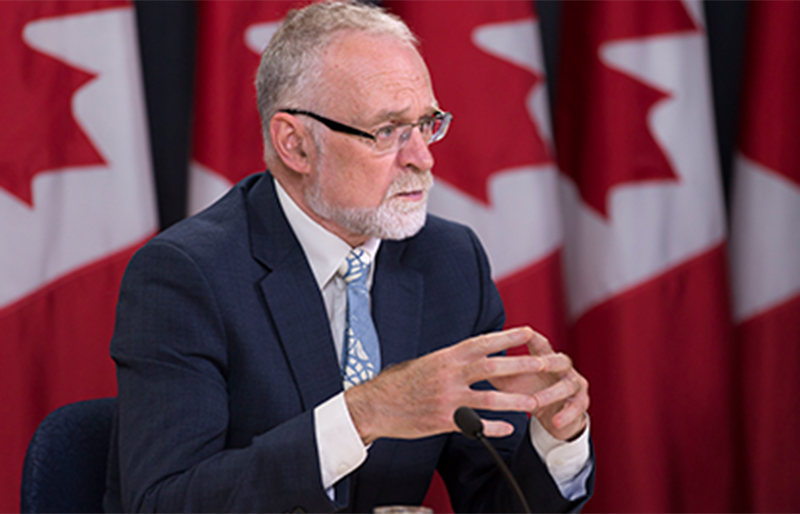
Michael Ferguson: A legacy of leading by example
On February 2, 2019, when the unexpected news hit that Michael Ferguson, Canada’s fiercely independent Auditor General, had succumbed to cancer, Mylène Lapierre, CPA, CA, CFE, was overseeing the CPA convocation in Ferguson’s native province of New Brunswick. Lapierre, who is the registrar and senior compliance officer of CPA New Brunswick, was a young professional working at the Office of the Auditor General in 2011 when Ferguson was appointed to the role by then-Prime Minister Stephen Harper.
“Michael consistently revealed great strength of character and determination – demonstrating that he was prepared to even learn a new language to ensure that he would represent and honour the Office in both official languages,” she says. “Working with him, I had the privilege of seeing him as a person. He was undoubtedly focused and resolved, but at the same time mindful and appreciative of the efforts of others. In media photos, it might be contended that he was a stern man, but in real life he was both gracious and approachable. He has inspired many CPAs and has served as a role model.”
“Mike believed strongly in public sector accountability, arguing that greater accountability is required when you use ‘other people’s money,’ says Martha Jones Denning, a member of the Public Sector Accounting Board (PSAB), who knew Ferguson for more than two decades and worked with him at PSAB since 2002. “He was a true example of integrity in the auditing profession.”
For good reason: Ferguson never let politics get in the way of protecting the public interest. His first report put the federal government on blast for misleading Canadians about the cost of new F35 fighter jets, lowballing the amount by $10B. Subsequent reports took deep dives into resettlement services for Syrian refugees, oversight of rail safety after the Lac-Mégantic train derailment, the Senate expense scandal, the Phoenix pay system fiasco, CRA practices and service levels, and the health and living conditions of Canada’s Indigenous people, which led him to characterize the federal government’s treatment of Indigenous people as an “incomprehensible failure.” New Democrat MP Charlie Angus, the party's critic for Indigenous youth, verbalized the feelings of many on both sides of the House of Commons when he called Ferguson a “passionate fighter for accountability in public life.”
Carol Bellringer, Auditor General for the Province of British Columbia, knows firsthand the challenges of maintaining accountability in the public arena. “The report is not the complete endgame. We release it to the governing body, who then has to go out and do something about it. As auditors and accountants, we want to see hard numbers, but it is difficult to measure exactly what the impact is. And there is always the risk the organization you’ve audited will breathe a sigh of relief when you’ve left the room and not actually make changes they need to make. That’s the biggest challenge: once you’re done, how to influence change without interfering with what is not your job to do.”
The frustration of filing annual reports and recommending reforms that were not implemented is something Ferguson lamented publicly. This lack of action also contributes to the expectation gap on the part of elected members who may not understand the difference between a financial statement audit and a performance audit, says Bellringer. “A performance audit goes much deeper but that does not mean looking at every dollar being spent by everybody in the entire government reporting entity.”
Another key challenge but critically important to the value of the audit is being able to maintain impartiality. “Demonstrating your view and your independence is key to protecting the public interest,” says Lapierre. “You have to be sure to present the facts, the real situation. Sometimes there is an expectation on the part of an agency being audited, but you have to be strong and stick to your decision regardless of the criticism. You have to present everything fairly. You can never lose sight of your ultimate objective—to protect the public interest—and Michael never did. He will always be seen as a champion of accountability.”
Lapierre credits the profession’s training and focus on ethics, integrity, skepticism, and independence as contributing to accountability and impartiality, but education and practice are just part of it. “I take comfort knowing that new CPAs receiving their designations have learned from his example and are carrying on Michael’s legacy of leadership, integrity and protecting Canadians.”